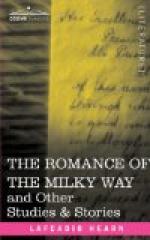Nemidar[’e] no
Nagaki kami woba
Furi-wak[’e]t[’e],
Chi hiro ni nobasu
Rokuro-Kubi kana!
[Oh!... Shaking loose
her long hair disheveled by sleep, the
Rokuro-Kubi stretches her
neck to the length of a thousand
fathoms!]
“Atama naki
Bak[’e]mono nari”—to
Rokuro-Kubi,
Mit[’e] odorokan
Onoga karada we.
[Will not the Rokuro-Kubi,
viewing with astonishment her
own body (left behind) cry
out, “Oh, what a headless goblin
have you become!”]
Tsuka-no-ma ni
Hari we tsutawaru,
Rokuro-Kubi
K[’e]ta-k[’e]ta warau—
Kao no kowasa yo!
[Swiftly gliding along
the roof-beam (and among the props
of the roof), the Rokuro-Kubi
laughs with the sound of
“k[’e]ta-k[’e]ta”—oh!
the fearfulness of her face![34]]
[Footnote 34: It is not possible to render all the double meanings in this composition. Tsuka-no-ma signifies “in a moment” or “quickly”; but it may also mean “in the space [ma] between the roof-props” [tsuka]. “K[’e]ta” means a cross-beam, but k[’e]ta-k[’e]ta warau means to chuckle or laugh in a mocking way. Ghosts are said to laugh with the sound of k[’e]ta-k[’e]ta.]
Roku shaku no
By[=o]bu ni nobiru
Rokuro-Kubi
Mit[’e] wa, go shaku no
Mi wo chijimi-k[’e]ri!
[Beholding the Rokuro-Kubi rise up above the six-foot screen, any five-foot person would have become shortened by fear (or, “the stature of any person five feet high would have been diminished").[35]]
[Footnote 35: The ordinary height of a full screen is six Japanese feet.]
VI. YUKI-ONNA
The Snow-Woman, or Snow-Spectre, assumes various forms; but in most of the old folk-tales she appears as a beautiful phantom, whose embrace is death. (A very curious story about her can be found in my “Kwaidan.”)
Yuki-Onna—
Yos[=o] kushi mo
Atsu k[=o]ri;
Sasu-k[=o]gai ya
K[=o]ri naruran.
[As for the Snow-Woman,—even
her best comb, if I mistake
not, is made of thick ice;
and her hair-pin[36], too, is
probably made of ice.]
[Footnote 36: K[=o]gai is the name now given to a quadrangular bar of tortoise-shell passed under the coiffure, which leaves only the ends of the bar exposed. The true hair-pin is called kanzashi.]
Honrai wa
K[=u] naru mono ka,
Yuki-Onna?
Yoku-yoku mireba
Ichi-butsu mo nashi!
[Was she, then, a delusion from the very first, that Snow-Woman,—a thing that vanishes into empty space? When I look carefully all about me, not one trace of her is to be seen!]
Yo-ak[’e]r[’e]ba
Ki[’e]t[’e] yuku [’e]
wa
Shirayuki[37] no
Onna to mishi mo
Yanagi nari-keri!




